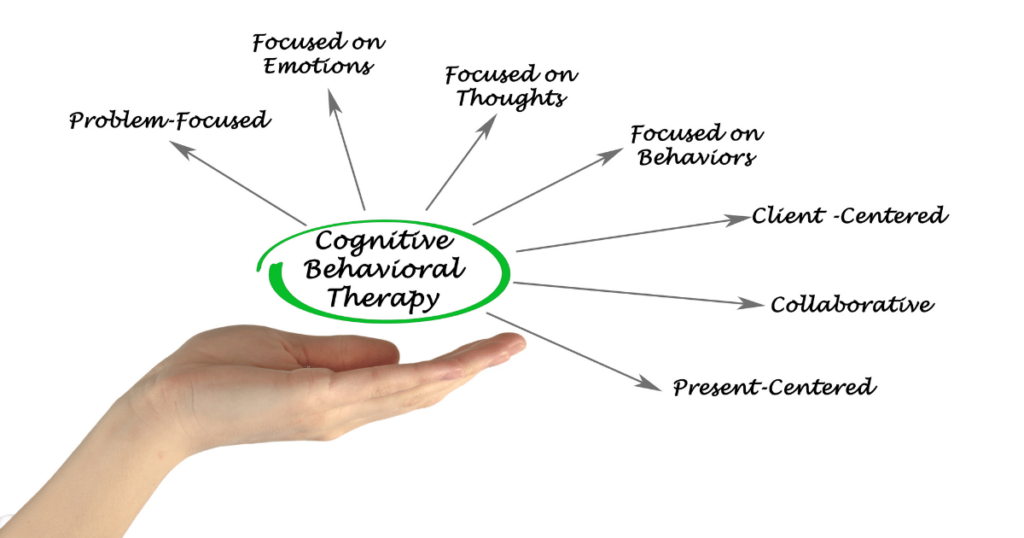Updated: July 19, 2022
How Negative Thinking Can Lead to Unhealthy Behavior
Many mental illnesses and addictions stem, in whole or in part, from negative thought patterns and inaccurate perceptions. These thought patterns can, in turn, lead to unhealthy habits or destructive behaviors. As a result, many people turn to alcohol or drugs as a coping method. According to reports published in the Journal of American Medical Association, almost 50% of people with mental disorders are affected by substance abuse.
That increases the need for evidence-based approaches, like cognitive behavioral therapy (CBT).
What is Cognitive Behavioral Therapy?
Cognitive behavioral therapy (CBT) is just one modality we use in psychotherapy, also known as talk therapy. CBT sessions are time-limited, problem-focused, and goal-oriented.
CBT is unlike more generalized talk therapy treatments, where you might discuss with your therapist how you’re feeling, or what happened during your week. CBT runs over a predetermined number of sessions and follows a targeted path of identifying the problem areas and using strategies and skills to improve quality of life.
CBT has proven effective in treating various mental health issues, including anxiety, depression, PTSD, substance abuse issues, and eating disorders. But this therapy is not exclusively reserved for individuals who have mental health issues. CBT can be used by anyone to help them deconstruct their feelings, analyze their responses, and help them deal with difficult or challenging situations.
Research shows that CBT is as effective as other forms of psychological therapy and psychotropic medications, and in some circumstances, even more so. CBT has been proven to successfully improve the quality of life and executive function for so many individuals. It can be used in conjunction with medication or other therapies to treat psychological disorders and trauma.
For many who are referred for CBT, their thinking is skewed, meaning it doesn’t always reflect reality. These misperceptions can lead us to view circumstances through an altered lens. We don’t react with a clear head, because alarm bells are ringing. Something is wrong; we are in danger, we are being ridiculed, challenged, humiliated, abandoned, criticized, or triggered.
Even the most average of situations can suddenly become a worst-case scenario. For example, this altered lens could cause someone with anxiety to see someone laughing in a public space and assume they are laughing at them.

How Does CBT Work?
CBT helps individuals learn to cope with stressful situations by identifying stressors and pinpointing their emotional and behavioral reactions through a series of steps:
- Identifying distorted patterns of thinking
- Knowing that your thoughts are emotional interpretations of an event, rather than facts
- Learning to distance yourself from your thoughts and apply a different lens of understanding
CBT targets cognition; in other words, conscious thoughts, automatic thoughts, and personal belief systems, which are influenced by our individual life experiences and childhood influences.
Because our automatic thoughts are often emotional rather than logical, they can misinterpret the realities of a situation. And despite our best efforts, our highly responsive, often-illogical automatic thoughts can overpower our rational, conscious thoughts, resulting in highly sensitive, overly-emotional behaviors.
How Can CBT Help Your Addiction?
By tackling negative thought patterns and emotional responses, CBT can help people cope with the emotions and mental symptoms that sometimes accompany substance use disorder. CBT treatment can help improve communication, deal with trauma and resolve conflicts.
If you’re struggling to manage substance use disorder, you don’t have to go through it alone. At Landmark Recovery, we have addiction treatment programs available at our treatment centers. We provide individual, group and family therapy to help you develop healthy patterns of thinking. Call 888-448-0302 to speak to our admissions team, or visit our locations page to find a treatment center in your area.

Choose Recovery Over Addiction
We're here 24/7 to help you get the care you need to live life on your terms, without drugs or alcohol. Talk to our recovery specialists today and learn about our integrated treatment programs.





